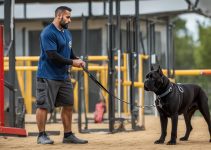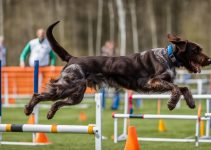Hello, I’m excited to share some valuable tips and techniques for German Shepherd training. German Shepherds are renowned for their intelligence and trainability, making them a popular choice for dog owners seeking a loyal and well-behaved companion. Whether you’re starting with a puppy or need to work on obedience with your adult German Shepherd, this article will provide valuable insights and guidance to help you achieve success.
Effective German Shepherd training begins with proper puppy training. During this stage, German Shepherds are highly impressionable and receptive to learning. It’s imperative to choose the right puppy from a reputable breeder or rescue organization. Socialization and crate training should be prioritized during the early months to lay a solid foundation for your German Shepherd’s behavior and obedience.
From 3 to 9 months of age, basic obedience training, recall training, and impulse control should be the primary focus. This stage is crucial for instilling good habits and ensuring your German Shepherd responds to commands reliably. As your German Shepherd matures, you can progress to more advanced training activities such as tracking and protection work.
Throughout the training process, it’s important to understand that German Shepherds require constant mental and physical stimulation. A structured training plan tailored to their specific needs is essential for their overall well-being and development. With patience, consistency, and dedication, you can achieve a well-behaved and obedient German Shepherd.
Learn German Shepherd Training
- Start early with puppy training to establish a strong foundation.
- Choose a reputable breeder or rescue organization to find the right German Shepherd puppy for your needs.
- Socialization and crate training are essential during the puppy stage.
- Focus on basic obedience training, recall training, and impulse control from 3 to 9 months.
- Progress to advanced training activities like tracking and protection work as your German Shepherd matures.
Finding the Right Puppy
When it comes to bringing a German Shepherd puppy into your life, finding the right one is essential. Whether you choose to buy from an ethical breeder or adopt from a breed-rescue organization, making sure the puppy fits your lifestyle and needs is crucial.
Working with an ethical breeder can provide you with the opportunity to match the perfect puppy to your individual or family dynamics. These breeders observe the personalities and drives of their puppies, allowing them to make informed decisions about which puppies are best suited for different households.
If adoption is more your style, breed-rescue organizations also offer a great way to find a German Shepherd puppy that aligns with your requirements. The dedicated volunteers at these organizations have a deep understanding of the breed and will work closely with you to find a puppy with the right temperament and personality.
When searching for your German Shepherd puppy, take the time to discuss your needs and expectations with the breeder or rescue organization. They will be able to guide you through the selection process and ensure that the chosen puppy will be a perfect match for you and your family.

Puppy Training Goals
During the puppy stage (8 to 16 weeks), there are several important training goals to focus on to set your German Shepherd up for success. These goals include socialization, crate training, housetraining, and introducing basic grooming tools.
Socialization
Socialization plays a vital role in the development of a well-rounded German Shepherd. It is necessary for them to learn how to interact with various people, animals, and environments. By exposing your puppy to different experiences, such as meeting friendly strangers, encountering new sights and sounds, and visiting different places, you can help them develop confidence and ensure they can distinguish between potential threats and harmless situations.
Crate Training
Crate training is highly recommended for German Shepherds as it serves multiple purposes. Firstly, it assists with housetraining by teaching your puppy to hold their bladder and bowels, as they instinctively avoid soiling their living space. Utilizing a crate also helps prevent separation anxiety, providing your pup with a safe and secure place to retreat to when you’re not around. Remember to make the crate a positive and inviting space, using treats and praise to create positive associations.
Introduction to Basic Grooming Tools
Introducing your German Shepherd puppy to basic grooming tools from an early age is essential for their future grooming experiences. Familiarize them with combs, brushes, and nail clippers in a gentle and positive manner. This helps them become comfortable with the process and eases any potential anxiety they may have associated with grooming. Regular grooming sessions will become more manageable as your puppy grows into an adult.
During the puppy stage, it is crucial to focus on socialization, crate training, housetraining, and introducing basic grooming tools. These goals will contribute to the development of a well-behaved and confident German Shepherd.
Obedience Training and Recall
During the crucial developmental stage of 3 to 9 months, obedience training plays a vital role in shaping your German Shepherd’s behavior. This is the time to focus on teaching fundamental commands such as sit, down, stay, and loose-leash walking. By establishing these basic obedience skills early on, you lay the foundation for a well-behaved and responsive dog.
One particularly essential aspect of training to prioritize during this stage is recall. Having a reliable recall command can potentially save your dog’s life in critical situations. By consistently practicing and reinforcing recall training, you can instill in your German Shepherd the instinct to return to you promptly when called.
In addition to obedience and recall, impulse control training is crucial for German Shepherd training. These intelligent and energetic dogs can be prone to problem behaviors like excessive barking, digging, and chasing. By actively working on impulse control, you can help your German Shepherd learn to control their impulses and make better choices.
One effective way to enhance obedience, recall, and impulse control is to ensure your dog’s attention is focused on you. Through obedience training, you can strengthen the bond between you and your German Shepherd, establishing yourself as the leader and primary source of guidance and direction.
The Importance of Obedience in German Shepherd Training
- Establishes boundaries: Obedience training helps your German Shepherd understand what is expected of them, setting clear boundaries for acceptable behavior.
- Enhances communication: Through training, you can establish effective communication with your dog, ensuring they understand your commands and cues.
- Promotes safety: Reliable obedience skills, such as sit and stay, can help keep your German Shepherd under control in potentially dangerous situations.
- Builds confidence: Training sessions provide mental stimulation and reinforce your German Shepherd’s self-confidence, leading to a happier and more well-adjusted dog.
Recall Training Tips
- Use high-value rewards: Using treats or toys that your German Shepherd finds particularly motivating can help reinforce the recall command and make it more enticing for your dog to come to you.
- Start in a controlled environment: Begin recall training in a quiet, distraction-free area before gradually increasing the level of difficulty in more challenging environments.
- Practice regularly: Consistency is key in recall training. Regularly schedule training sessions to reinforce the recall command and ensure your German Shepherd maintains a strong response.
Impulse Control Techniques
- Engage in structured play: Incorporate games and activities that help redirect your German Shepherd’s energy in a positive and controlled manner, rewarding calm behavior.
- Teach self-control exercises: Train your dog to wait for permission before accessing resources like food or toys, helping them develop self-discipline.
- Practice “leave it” and “drop it” commands: These commands can help prevent your German Shepherd from impulsively grabbing or keeping items they shouldn’t have.
Remember, obedience training, recall training, and impulse control are essential components of raising a well-behaved and disciplined German Shepherd. By investing time and effort into these training areas, you can ensure a strong and lasting bond with your canine companion.

Advanced Training and Maintenance
Once your German Shepherd reaches 9 to 24 months of age, it’s time to focus on advanced German Shepherd training to further enhance their obedience skills and engage them in more specialized activities. This phase of training allows your German Shepherd to showcase their intelligence and versatility. Here are some key aspects to consider:
-
Tracking
Tracking exercises help develop your German Shepherd’s natural instincts by teaching them to follow scents and locate specific objects or individuals. This type of training taps into their keen sense of smell and enhances their problem-solving abilities.
-
Protection Training
Protection training involves teaching your German Shepherd essential skills to protect you and your property. It focuses on controlled aggression, defensive techniques, and instinctive responses. This type of training builds confidence in your dog and strengthens the bond between you.
-
Agility and Herding
Engaging your German Shepherd in agility courses or herding exercises allows them to display their physical prowess and natural herding instincts. These activities provide mental and physical stimulation while promoting coordination and obedience.
As your German Shepherd transitions into adulthood, it’s important to continue reinforcing their training and ensuring consistency. Alongside training, it’s crucial to transition from puppy food to a high-quality large breed dog food suitable for their nutritional needs. A balanced diet supports their growth and development, keeping them healthy and active.
Remember, German Shepherds thrive on constant mental and physical stimulation. Offer them plenty of opportunities to exercise their intelligence and versatility through advanced training activities. This investment in their training and well-being will reward you with a well-rounded and obedient companion.
Conclusion
German Shepherd training requires time, consistency, and dedication. By starting early with puppy training, socialization, crate training, and housetraining, you can set a solid foundation for your German Shepherd’s obedience and behavior. From basic obedience to advanced training activities, such as tracking and protection work, the focus should be on rewarding good behavior, maintaining consistency, and providing constant mental and physical stimulation. With successful German Shepherd training, your German Shepherd will become a well-behaved, obedient, and loyal companion.
A well-trained German Shepherd is a joy to have as a pet. They are intelligent, adaptable, and highly obedient when properly trained. By investing time and effort in their training, you can ensure that your German Shepherd grows up to be a well-behaved member of your household.
Remember, consistency is key. German Shepherd training sessions should be frequent and structured, with clear goals and expectations. Positive reinforcement, such as treats and praise, can be used to reward your German Shepherd for good behavior. It is also important to provide mental and physical stimulation through activities like agility, obedience trials, and interactive play.
FAQ
What is the best age to start training a German Shepherd?
Effective German Shepherd training starts with puppy training, as GSDs are most impressionable during this stage.
How can I find a reputable German Shepherd puppy breeder or rescue organization?
Finding a reputable breeder or rescue organization is vital to ensure you get a German Shepherd puppy that fits your lifestyle and needs.
What are the important training goals during the puppy stage?
Socialization, crate training, and housetraining are important goals during the puppy stage.
What should I focus on during the 3 to 9-month stage of training?
Basic obedience training, recall training, and impulse control should be focused on during the 3 to 9-month stage.
What activities should I introduce to my German Shepherd from 9 to 24 months of age?
From 9 to 24 months, German Shepherds should continue training and can be introduced to advanced activities such as tracking and protection training.
How do I train my German Shepherd to be well-behaved and obedient?
Training a German Shepherd requires time, consistency, and dedication, starting with puppy training and progressing to advanced training activities.






